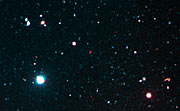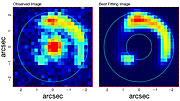Press Release
Einstein Ring in Distant Universe
Astronomers Using the VLT Discover Bright Cosmic Mirage Far Away
30 June 2005
Using ESO's Very Large Telescope, Rémi Cabanac and his European colleagues have discovered an amazing cosmic mirage, known to scientists as an Einstein Ring. This cosmic mirage, dubbed FOR J0332-3557, is seen towards the southern constellation Fornax (the Furnace), and is remarkable on at least two counts. First, it is a bright, almost complete Einstein ring. Second, it is the farthest ever found.
"There are only a very few optical rings or arcs known, and even less so in which the lens and the source are at large distance, i.e. more than about 7,000 million light-years away (or half the present age of the Universe)", says Rémi Cabanac, former ESO Fellow and now working at the Canada-France-Hawaii Telescope. "Moreover, very few are nearly complete", he adds.
But in the case of this newly found cosmic ring, the images show it to extend to almost 3/4 of a circle. The lensing galaxy is located at a distance of about 8,000 million light-years from us, while the source galaxy whose light is distorted, is much farther away, at 12,000 million light-years. Thus, we see this galaxy as it was when the universe was only 12% of its present age. The lens magnifies the source almost 13 times.
The observations reveal the galaxy acting as a lens to be a rather quiet galaxy, 40,000 light-years wide, with an old stellar population. The far away lensed galaxy, however, is extremely active, having recently experienced bursts of star formation. It is a compact galaxy, 7,000 light-years across.
"Because the gravitational pull of matter bends the path of light rays, astronomical objects - stars, galaxies and galaxy clusters - can act like lenses, which magnify and severely distort the images of galaxies behind them, producing weird pictures as in a hall of mirrors", explains Chris Lidman (ESO), co-discover of the new cosmic mirage.
In the most extreme case, where the foreground lensing galaxy and the background galaxy are perfectly lined up, the image of the background galaxy is stretched into a ring. Such an image is known as an Einstein ring, because the formula for the bending of light, first described in the early twentieth century by Chwolson and Link, uses Albert Einstein's theory of General Relativity.
Gravitational lensing provides a very useful tool with which to study the Universe. As "weighing scales", it provides a measure of the mass within the lensing body, and as a "magnifying glass", it allows us to see details in objects which would otherwise be beyond the reach of current telescopes.
From the image, co-worker David Valls-Gabaud (CFHT), using state-of-the-art modelling algorithms, could deduce the mass of the galaxy acting as a lens - it is almost one million million suns.
More information
The paper describing this research has been published as a Letter to the Editor in Astronomy and Astrophysics, volume 436, L21-L25 ("Discovery of a high-redshift Einstein ring", by R.A. Cabanac, D. Valls-Gabaud, A.O. Jaunsen, C. Lidman, and H. Jerjen). The paper is available for download in PDF format from the A&A web site.
Contacts
Rémi Cabanac
Canada-France-Hawaii Telescope
Hawaii, USA
Tel: +1 808 885 3163
Email: cabanac@cfht.hawaii.edu
Chris Lidman
ESO
Chile
Tel: +56 55 43 5311
Cell: +56 2 463 3106
Email: clidman@eso.org
David Valls-Gabaud
Observatoire Midi-Pyrenees
Toulouse, France
Tel: +33 5 61 33 29 46
Email: dvg@ast.obs-mip.fr
Helmut Jerjen
Mount stromlo Observatory
Australia
Tel: +61 2 6125 80 38
Email: jerjen@mso.anu.edu.au
About the Release
| Release No.: | eso0521 |
| Legacy ID: | Photo 20a-c/05 |
| Name: | Einstein Ring, FOR J0332-3557, Fornax Constellation |
| Type: | Early Universe : Galaxy : Grouping : Cluster |
| Facility: | Very Large Telescope |
| Instruments: | FORS1, FORS2, ISAAC |
| Science data: | 2005A&A...436L..21C |
Our use of Cookies
We use cookies that are essential for accessing our websites and using our services. We also use cookies to analyse, measure and improve our websites’ performance, to enable content sharing via social media and to display media content hosted on third-party platforms.
ESO Cookies Policy
The European Organisation for Astronomical Research in the Southern Hemisphere (ESO) is the pre-eminent intergovernmental science and technology organisation in astronomy. It carries out an ambitious programme focused on the design, construction and operation of powerful ground-based observing facilities for astronomy.
This Cookies Policy is intended to provide clarity by outlining the cookies used on the ESO public websites, their functions, the options you have for controlling them, and the ways you can contact us for additional details.
What are cookies?
Cookies are small pieces of data stored on your device by websites you visit. They serve various purposes, such as remembering login credentials and preferences and enhance your browsing experience.
Categories of cookies we use
Essential cookies (always active): These cookies are strictly necessary for the proper functioning of our website. Without these cookies, the website cannot operate correctly, and certain services, such as logging in or accessing secure areas, may not be available; because they are essential for the website’s operation, they cannot be disabled.
Functional Cookies: These cookies enhance your browsing experience by enabling additional features and personalization, such as remembering your preferences and settings. While not strictly necessary for the website to function, they improve usability and convenience; these cookies are only placed if you provide your consent.
Analytics cookies: These cookies collect information about how visitors interact with our website, such as which pages are visited most often and how users navigate the site. This data helps us improve website performance, optimize content, and enhance the user experience; these cookies are only placed if you provide your consent. We use the following analytics cookies.
Matomo Cookies:
This website uses Matomo (formerly Piwik), an open source software which enables the statistical analysis of website visits. Matomo uses cookies (text files) which are saved on your computer and which allow us to analyze how you use our website. The website user information generated by the cookies will only be saved on the servers of our IT Department. We use this information to analyze www.eso.org visits and to prepare reports on website activities. These data will not be disclosed to third parties.
On behalf of ESO, Matomo will use this information for the purpose of evaluating your use of the website, compiling reports on website activity and providing other services relating to website activity and internet usage.
Matomo cookies settings:
Additional Third-party cookies on ESO websites: some of our pages display content from external providers, e.g. YouTube.
Such third-party services are outside of ESO control and may, at any time, change their terms of service, use of cookies, etc.
YouTube: Some videos on the ESO website are embedded from ESO’s official YouTube channel. We have enabled YouTube’s privacy-enhanced mode, meaning that no cookies are set unless the user actively clicks on the video to play it. Additionally, in this mode, YouTube does not store any personally identifiable cookie data for embedded video playbacks. For more details, please refer to YouTube’s embedding videos information page.
Cookies can also be classified based on the following elements.
Regarding the domain, there are:
- First-party cookies, set by the website you are currently visiting. They are stored by the same domain that you are browsing and are used to enhance your experience on that site;
- Third-party cookies, set by a domain other than the one you are currently visiting.
As for their duration, cookies can be:
- Browser-session cookies, which are deleted when the user closes the browser;
- Stored cookies, which stay on the user's device for a predetermined period of time.
How to manage cookies
Cookie settings: You can modify your cookie choices for the ESO webpages at any time by clicking on the link Cookie settings at the bottom of any page.
In your browser: If you wish to delete cookies or instruct your browser to delete or block cookies by default, please visit the help pages of your browser:
Please be aware that if you delete or decline cookies, certain functionalities of our website may be not be available and your browsing experience may be affected.
You can set most browsers to prevent any cookies being placed on your device, but you may then have to manually adjust some preferences every time you visit a site/page. And some services and functionalities may not work properly at all (e.g. profile logging-in, shop check out).
Updates to the ESO Cookies Policy
The ESO Cookies Policy may be subject to future updates, which will be made available on this page.
Additional information
For any queries related to cookies, please contact: pdprATesoDOTorg.
As ESO public webpages are managed by our Department of Communication, your questions will be dealt with the support of the said Department.



